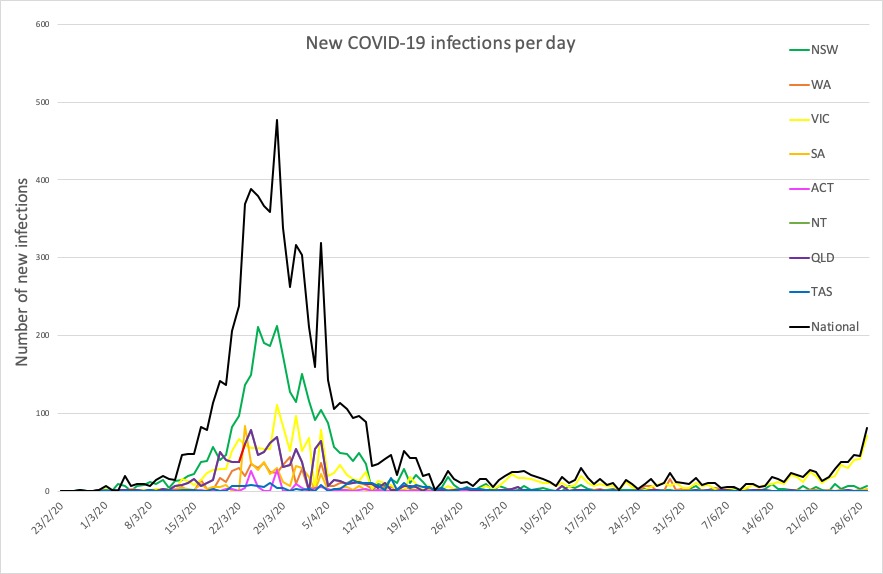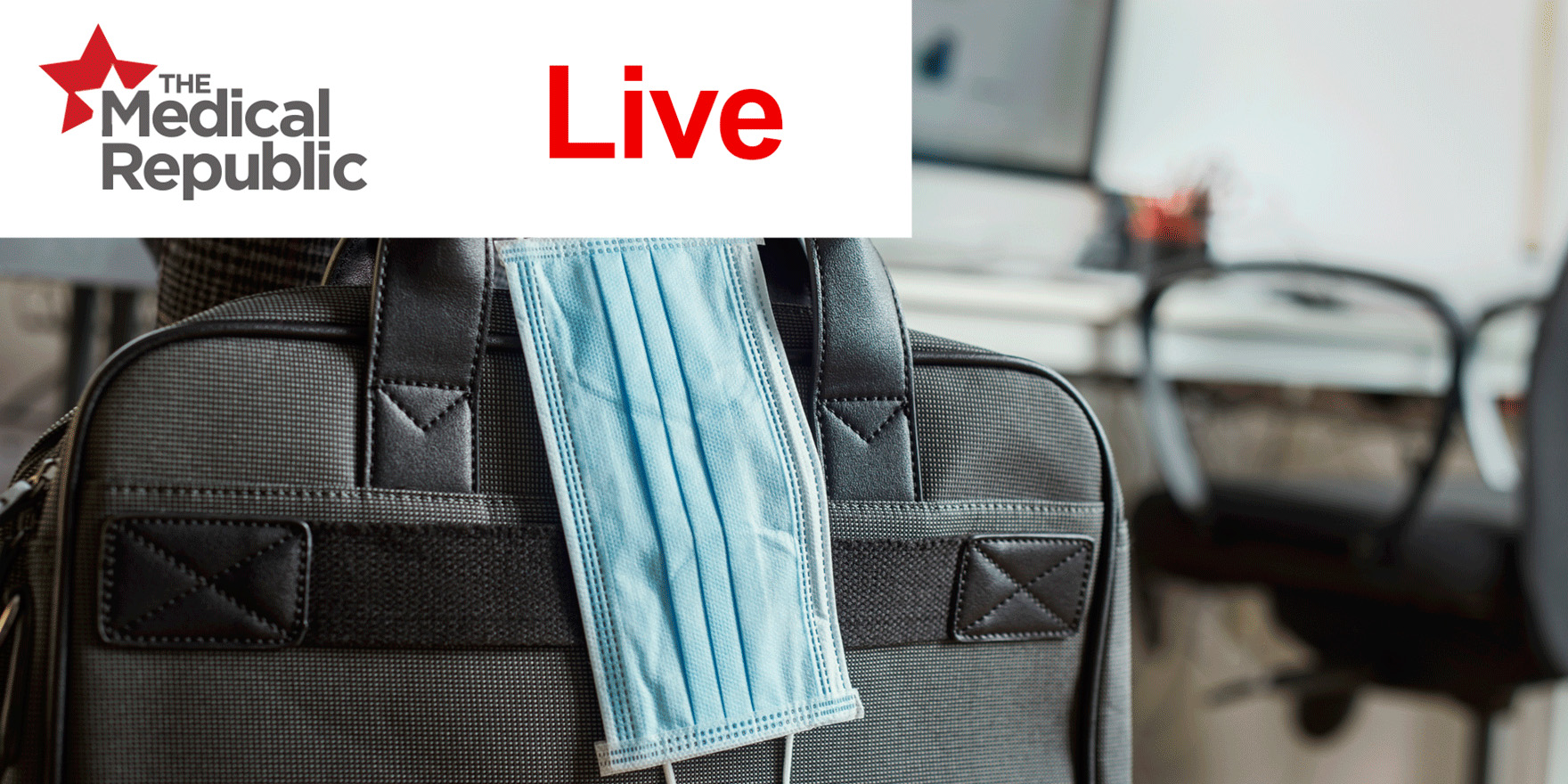Remdesivir maker Gilead has set the price for its COVID-19 treatment at US$520 (AU$755) a dose for the US, sparking criticism it is profiting from a drug originally developed from publicly funded research
Welcome to The Medical Republic‘s live COVID-19 blog.
Got any tips, comments or feedback? Email me at bianca@biancanogrady.com
The latest
- Afternoon update: Gilead accused of jacking up price of remdesivir, average daily step counts drop after pandemic declared, and no benefits from ritonavir/lopinavir combo in COVID-19.
- Morning update: COVID-19 pandemic associated with delays in paediatric emergency presentations for malignancy, sepsis and diabetes, UK study finds.
- Only one of Victoria’s 71 new COVID-19 cases reported yesterday was acquired overseas.
- Remdesivir manufacturer Gilead has set the price for its COVID-19 treatment at US$520 (AU$755) per dose for the United States, sparking criticism that it is profiting from a drug originally developed from publicly-funded research.
According to a report in The Washington Post, an earlier independent analysis suggested Gilead could recover its R&D costs for the drug – which Gilead claims are in the vicinity of US$1 billion – if it distributed it for up to US$160 per dose. However the company has said it will charge US hospitals US$3120 (AU$4534) for a course for a typical patient with private health insurance
The pharmaceutical company has said it will charge 25% less for the drug for high-income countries outside the United States, and has licensed generic manufacturers in developing economies so they can produce the drug at even lower cost. - Within one month of the pandemic being declared, average daily step counts were down by around a quarter, according to a study using deidentified data from over 455,000 users of a smartphone health app.
The study, published in the Annals of Internal Medicine, analysed data from 19 January to 1 June 2020 across 187 countries and found that within 10 days of the pandemic being declared, there was an average 5.5% decrease in daily step counts, and by 30 days there was a 27.3% decrease.
The study showed the impact of different lockdown measures in different countries. In Italy, which implemented a nationwide lockdown, daily step counts decreased by a maximum of 48.7%. In Sweden, which focused more on social distancing and limited gatherings, step counts only decreased by just under 7%.
“The effect of social distancing measures on overall physical activity, an important determinant of health, should be considered, particularly if prolonged social distancing is required,” the authors wrote. - HIV antiviral combination ritonavir-lopinavir does not appear to offer any benefits in the treatment of COVID-19, according to a statement from the UK-based RECOVERY trial.
The trial randomised 1596 patients with COVID-19 to the combination antivirals and 3376 patients to usual care, and found no significant difference in 28-day mortality, the risk of progression to mechanical ventilation or to the length of hospital stay, even in subgroup analysis.
The full results are yet to be published.
- The COVID-19 pandemic in the UK has seen significantly fewer paediatric presentations to emergency department, and a study in the Archives of Disease in Childhood has suggested at least nine deaths resulted from delayed presentation for sepsis or malignancy.
An electronic survey of 2433 paediatric consultants in the UK and Ireland revealed that nearly one-third of the 752 consultants working in emergency departments or paediatric assessment units had seen delayed presentations; in some areas such as the Midlands, that figure was as high as 47%.
The most common delayed presentation was a newly diagnosed diabetes or diabetic ketoacidosis, and they also saw delayed presentations for malignancy and sepsis. Overall, the survey found nine deaths where the delay in presenting to hospital was believed to have contributed to the death.
Neonatologists also reported concerns about late presentations during labour, which resulted in adverse maternal or neonatal outcomes. They also suggested that some women were discharged early after labour, before feeding had been established, and then later returned with feeding difficulties and dehydrated infants.
“Community paediatricians and oncologists were particularly concerned by the fall in referral rates for child protection and cancer assessment, respectively,” the authors wrote.
The authors stressed that children were at very low risk for severe COVID-19 infection from attending clinics or hospitals, and that parents should not delay seeking medical or emergency care if they had concerns.
“Otherwise, the unintended consequences of the lockdown will do more harm and claim more children’s lives than COVID-19.” - COVID-19 may be associated with neurological and psychiatric complications such as cerebrovascular events or new-onset psychiatric diagnoses, a US study suggests.
Writing in The Lancet Psychiatry, researchers presented the findings from analysis of 125 COVID-19 cases with complete clinical assessments, that were reported through an online network of notification portals created in early April by a group of UK neuroscience and psychiatry organisations.
The most common presentation was cerebrovascular event, most of which were ischaemic stroke. However nearly one-third of presentations were for altered mental state – encephalopathy being the most common, but 23 patients met the criteria for a psychiatric diagnosis, only two of which had existing mental illness.
“Although cerebrovascular events and altered mental status were identified across all age groups, our cohort confirms that cerebrovascular events predominate in older patients; however, these early data identify that acute alterations in mental status were disproportionately overrepresented in younger patients in our cohort,” the authors wrote.
They also noted that the ‘exponential growth’ seen in neurological and psychiatric presentations over time matched the growth in COVID-19 notifications in the UK.
- Of Victoria’s 71 new COVID-19 cases reported yesterday, just one was in a returned traveller in hotel quarantine. Despite the recent surge in cases, no new deaths have been reported and only one patient of the state’s 288 active cases is currently in intensive care. South Australia has also reported three new cases – all in returned travellers – after more than a month of static numbers.
Elsewhere in Australia, the tally of confirmed COVID-19 cases to 9pm yesterday is:
National – 7767, with 104 deaths and 7008 recovered.
ACT – 108
NSW – 3184
NT – 29
QLD – 1067
SA – 443
TAS – 228
VIC – 2099
WA – 609



